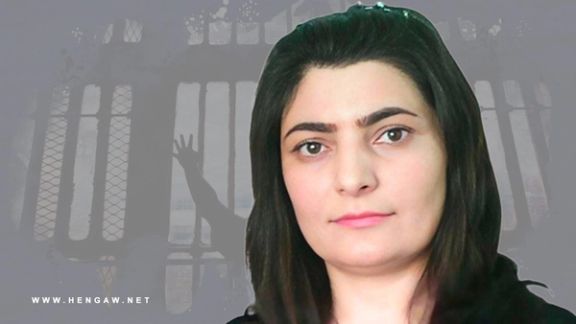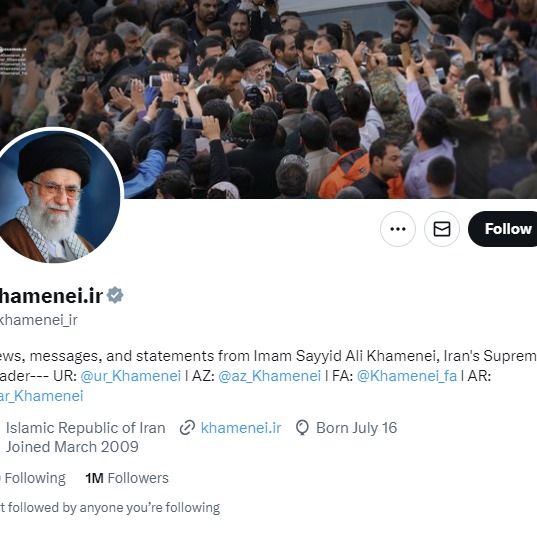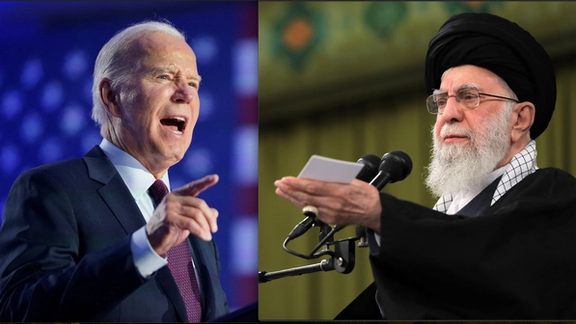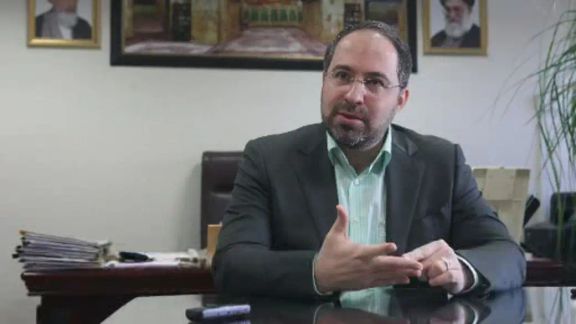Iran's Female Political Prisoner Deprived Of Medical Care

Zeinab Jalalian, the longest-serving female political prisoner in Iran, is facing dire conditions as she marks the end of her sixteenth year behind bars without proper medical attention.

Zeinab Jalalian, the longest-serving female political prisoner in Iran, is facing dire conditions as she marks the end of her sixteenth year behind bars without proper medical attention.
Despite suffering from multiple physical ailments, Jalalian has been denied furlough and has not been segregated from common prisoners according to regulation in Yazd prison.
According to reports from the US-based Human Rights Activists News Agency (HRANA) citing a source close to Jalalian's family, she was supposed to be transferred to Yazd hospital for the treatment of an eye infection on Tuesday. However, due to negligence from prison authorities, she was not sent to the hospital.
Jalalian's health continues to deteriorate, with her vision severely declining due to the progression of the eye infection. Additionally, she suffers from kidney and digestive diseases, but she has not received proper medical care.
Arrested in 2008, Jalalian was initially sentenced to death by the Revolutionary Court on charges of belonging to an armed opposition group. The sentence was later commuted to life imprisonment in 2011.
Throughout her detention, Jalalian has repeatedly denied the accusations and has spoken out about torture and harassment she has endured, including physical assaults and threats of sexual assault.
Jalalian's case highlights the broader issue of the lack of medical attention given to political prisoners in Iran and the denial of their right to proper treatment by prison authorities. Many political prisoners, including activists like Sasan Niknafs and Behnam Mahjoubi, have lost their lives in similar circumstances, with the Islamic Republic refusing to accept responsibility for their deaths.

Many Iranians, who welcomed Meta’s decision to remove the Iranian Supreme Leader’s Instagram and Facebook accounts, are now urging Elon Musk to follow suit and deactivate his X accounts.
Meta took the step of shutting down the Iranian leader's Instagram and Facebook accounts on Thursday. A spokesperson for Meta stated that this action was taken due to repeated violations of Meta's policies concerning "dangerous organizations and individuals."
A post on X suggested a tweet storm to ask Musk to follow Meta’s example and shut down Khamenei’s accounts, a demand long pursued by Iranian activists and many social media users. “A country that bans something for its populace should not have the right to use it,” the tweet said.
“A dictator who denies people the right to use social networks should not have the right to access them,” another tweet said.
Iranians can only access Instagram and other major social media and instant messaging platforms such as X, Facebook, WhatsApp, and Telegram if they have installed anti-filtering software on their devices. They need to circumvent government filters that make these apps inaccessible in the country.
Khamenei's Persian and English Instagram accounts boast over five million and 200,000 followers, respectively. His accounts in Persian and English on X each have one million and 727 thousand followers. Additionally, he maintains X accounts in various other languages, including Arabic, French, Urdu, and Azerbaijani.
Meta has not offered details of the instances of violations of its policies by Khamenei’s accounts, but there are speculations the decision was prompted by these accounts voicing support and praising regime entities designated as terrorist by the United States and other western countries. Middle East Eye attributed the closure of the accounts to pressure from pro-Israel groups.
Instagram is the second most popular social platform in Iran after Telegram with over forty million users. Both platforms are used by millions of small and home-based businesses for marketing.
Khamenei has repeatedly called for the "eradication of Israel" and commended the October 7 attack by Hamas on Israel. On the day of the Hamas attack on Israeli cities, Khamenei's former Twitter account, now referred to as X, stated, "the cancer of the usurper Zionist regime will be eradicated at the hands of the Palestinian people and the resistance forces throughout the region."
The ban on Instagram, the only social platform not blocked by authorities, was announced on September 21, 2022, a few days after anti-government protests sparked by the death of 22-year-old Mahsa Amini in the custody of morality police engulfed the country. The ban, along with frequent internet blackouts, aimed to prevent protesters from sharing news and footage of the crackdowns.
For years, many in Iran have relied on VPNs and anti-filtering software to navigate through government censorship and blocked social media and websites. The use of VPNs to help access to banned social platforms and websites, however, surged by 30-fold in the following months.
A recent report by the e-commerce center of the ministry of industries showed Instagram to be the most used social platform in e-commerce with 55 percent of these businesses relying on it, followed by Telegram (41 percent) and WhatsApp (37 percent).
Social media users in Iran have largely shunned domestically developed social media applications such as Wisgoon and Nazdika, designed to replace Instagram, and Rubika, a messaging application, for various reasons including their quality and lack of privacy.
Experts have warned that domestic apps, which the authorities are trying to promote, are very vulnerable to government intrusion and there are serious safety and privacy concerns including the fear that security services could be able to spy on people through them.

A human rights group has warned about a disturbing trend in Iran's judiciary system, reporting a significant surge in issuing death penalties during January.
According to the US-based Human Rights Activists News Agency (HRANA), Iranian courts issued 35 death sentences, marking the highest number of death penalties issued within a single month in over a year. Meanwhile, a total of 86 people were executed across the country during January alone.
The surge comes on the heels of a similarly grim situation in January 2023, during which at least 63 people were executed in Iran, with 23 death sentences issued.
Despite mounting international calls for the abolition of the death penalty, particularly for non-serious crimes, Iran persists in carrying out executions. HRANA contends that the Iranian government utilizes the issuance and implementation of death sentences as a means to quell dissent. Notably, Mohammad Ghobadloo, a protester detained during the 2022 uprising, was among those executed in January 2024.
The concluding section of the report emphasizes the Islamic Republic's response to global demands for upholding human rights standards. It calls for judges, interrogators, and members of security forces involved in violating the standards to face recognition of their responsibility through international sanctions.
A recent Amnesty International report further underscored the severity of the situation, revealing that from January 1, 2012, to July 31, 2023, over five thousand individuals, including at least 57 children, were executed in Iran.

Since assuming the position of Supreme Leader of Iran in 1989, Ali Khamenei has steadfastly adhered to his ‘no-talks, no-détente’ policy towards the US, a pivotal element of his strategic approach.
This does not mean that the Iranian government refrained from clandestine and overt sporadic negotiations with the United States, undertaken with specific objectives to safeguard its interests. However, none of these negotiations were directed at alleviating tensions.
An illustrative instance and what ensued is evident in Khamenei's remarks during the 2015 nuclear talks: “The ongoing discussions, including those with Americans, solely revolve around the nuclear issue. Now, should the opposing side rectify its misconduct, that could serve as a precedent for broader discussions on other matters as well.”
However, subsequent developments revealed that this statement was not entirely candid. Consider the following timeline:

In essence, Khamenei expressed this view before even the ink on the signatures had dried, let alone allowing time to observe whether the US would rectify what he labeled as its ‘misconduct.’ When Donald Trump withdrew from the nuclear deal in 2018, it provided Khamenei with a golden opportunity to assert, “I told you so.” He said, “The nuclear talks were a mistake. I made a mistake. As a result of the insistence of the gentlemen (referring to the then moderate administration of Hassan Rouhani), I allowed an experiment.”
He has consistently asserted that the conflict between the Iranian government and the US is a “certain and inevitable” situation. The central doctrine of the Iranian Revolutionary Guards (IRGC), which is Iran’s other locus of power besides Khamenei, also maintains that the hostility between the Islamic Republic and America is “fundamental and existential that cannot be resolved through negotiation and compromise.”
But why is the Iranian radical camp led by Khamenei so resolute and persistent in maintaining its “no talks, no détente” stance towards the United States?
While a prevailing explanation attributes this unwavering position to ideological differences, and there is no denying of the role of ideology, over the course of Khamenei’s 35-year rule, three presidents—Akbar Hashemi Rafsanjani, Mohammad Khatami, and Hassan Rouhani—attempted to mend US-Iran relations, all in vain.
Rafsanjani, who was the key to Khamenei becoming Supreme Leader, died in suspicious circumstances in 2017, while having been ostracized from politics. The other two presidents considered old guards, have not only been marginalized but also silenced. In a notable example, in 2003, under Khatami’s presidency, his administration unofficially proposed a “grand bargain deal” to the US government aimed at resolving all the disputed issues. The offer was rejected by the George W. Bush administration, which deemed it insincere without Khamenei's endorsement.
In contrast, the Soviet Union, despite deep ideological differences and strategic rivalry with the US during the peak of the Cold War, maintained diplomatic relations at the highest level and signed détente agreements with America. Similarly, communist-ruled China and Vietnam not only have full diplomatic relations with the US but also boast extensive economic ties.
A deeper comprehension of this conflict can be grasped through the lens of realpolitik. Khamenei censures individuals who advocate for negotiations with the US, remarking, "Some people are negligent and naive regarding talks [with the US] and fail to grasp the complexity of the issues." So, what exactly is the complexity of these issues?
Infiltration
Observing Khamenei's representatives across various institutions—ranging from the judiciary to the Guardian Council, the IRGC, the army, universities, and government agencies—it becomes apparent that Iran’s ruler staunchly supports individuals who harbor a shared sentiment of anti-Americanism and fears regarding the “infiltration” of America in Iran. In essence, by adhering to this stance, they are safeguarding their very existence.
The conservatives and Khamenei express deep concerns about the prospect of engaging in negotiations with the US and the potential relaxation of tensions, fearing the threat of "infiltration" that could jeopardize the existing traditionalist system. Within this apprehension, Khamenei underscores the significance of cultural influence as the most alarming form of infiltration. He asserts, “The enemy seeks to alter the societal beliefs in the cultural context, manipulating the very beliefs that have upheld this society (read the Islamic government) to inflict damage, create disruptions, and introduce breaches. They allocate billions of dollars for this purpose—this is cultural infiltration.”
Opening doors to America, given the significant allure of American pop culture, acknowledged as a key element of America’s soft power by the renowned political scientist Joseph Nye, could undermine the ideological foundation and authoritarian control of the system. While some argue that a considerable portion of society is already an admirer of Western culture, Khamenei’s concern pertains to the other segment—the traditionalists and devout religious individuals who, despite being a minority in Iran, currently support him, constituting the political base of the existing system.
Rise of technocrats
The rise of technocrats, a trend disliked by Khamenei and reminiscent of his predecessor, Ayatollah Ruhollah Khomeini, who also distrusted them for their association with modernity and Western culture, could emerge as another consequence of nurturing economic ties with the US.
Reestablishing relations with the US could lead to an expansion of trade and commerce, consequently resulting in a surge in the number of Iranians visiting the US and vice versa. The consequence of such exchanges might manifest in the emergence of what conservatives call as “Westoxificated” technocrats as a significant force in Iranian society.
Reconciliation with the US - end of the revolution
Reconciliation with the United States would symbolize the demise of the revolution. Its conclusion would render the supreme leader, Revolutionary Guards, and the hard-line camp obsolete. This is why the IRGC emphasizes that the conflict between the US and Iran is existential and cannot be resolved through negotiations. Enmity towards the US serves as a rallying point for radicals and conservatives led by Khamenei to mobilize their supporters. Reconciliation with the US would undercut the narrative of the deep state, diminishing its capacity to rally its political and religious base, and repression of dissidents.
Where does this conundrum lead?
Khamenei and his cadre of hardliners blame Donald Trump for withdrawing from the nuclear deal. However, the reality is that Khamenei has undermined US-Iran relations for the last 35 years by obstructing sustained talks aimed at détente between the two states. In the absence of diplomacy and bilateral talks to alleviate and contain tensions both in rhetoric and actions—it was inevitable that, regardless of who occupied the White House in the years following the 2015 deal, the nuclear agreement would become unstable and collapse.
However, this is not the sole outcome of the current status quo crafted by Khamenei. When two governments are entrenched in such an antagonistic relationship, ceaselessly plotting and executing actions to harm each other's interests, and fail to mitigate tensions through talks, the question arises: what eventual solution remains other than war to resolve this conflict? Even if neither side expresses a desire for war, as both sides often assert, a spark or a miscalculation can ignite the flames of war. It is a matter of time.

The sister of Johan Floderus, the Swedish EU diplomat detained in Iran, has condemned his captivity as a manipulative act within a larger “political game.”
Floderus, 33, was detained by Iranian authorities in April 2022 at Tehran airport following a visit to a friend working at the Swedish embassy. Since then, he has been subjected to distressing conditions in Evin prison.
At the time of his arrest, Floderus was employed on the Afghanistan desk of the European External Action Service (EEAS), the diplomatic arm of the European Union.
Reports emerged last Sunday indicating that the Iranian prosecutor is seeking the death penalty for Floderus on charges of espionage for Israel and "corruption on earth," a capital offense under Tehran's Islamic laws.
Floderus becomes the latest victim of what many term “hostage diplomacy”, where Western citizens are arbitrarily detained by the Iranian regime on unfounded espionage charges. While previous detainees have been released following concessions by Western governments, the prosecutor's push for the death penalty has stunned Floderus' family.
Speaking to Euronews at a #FreeJohanFloderus campaign event in Brussels, his sister Ingrid Floderus emphasized his innocence, stating, "He is an innocent man. I don't think that anyone really feels like my brother has done those crimes that he has been accused of."
She added, "This is about some big political game where my brother is being used as a pawn, and that is really, for me, something I cannot accept."
Floderus, an alumnus of Oxford University, is believed to be caught in a web of political pressure aimed at the Swedish government. Observers suggest his detention could be linked to Tehran's efforts to coerce the release of Hamid Nouri, a former judicial official of the Islamic Republic, sentenced to life imprisonment for his role in the 1980s political prisoner massacre, which saw the execution of up to 5,000 individuals.

The second court session was held in Canada Thursday to decide if Salman Samani, a former senior official of Iran's Interior Ministry, should be expelled from the country.
Lasting for six hours, the session saw notable revelations, including Samani asserting his role as a “servant of the people rather than the government of the Islamic Republic.”
Samani, intruding himself as a dentist in Canada earning a modest income, appealed to the Canadian government, which is trying to deport Canada-based Iranians with links to the Islamic Republic.
The legal saga began when Samani's name appeared on a list of individuals announced by the Canadian Border Security Agency on December 7, mandating their deportation from Canada. The action triggered a legal battle, with Samani filing a request with the Federal Court of Canada.
The deportation is in line with sanctions implemented in November 2022, preventing senior members of the Iranian regime from entering Canada.
The measures were imposed after Iran's morality police killed Mahsa Amini for defying hijab laws. Amini's death garnered international condemnation and became a symbol of resistance against the repression of women under Iran's clerical regime.
Last week, Majid Iranmanesh, the former director general of Iran’s Vice-Presidency for Science and Technology,was given a final expulsion order from the Canadian Immigration and Refugee Board about. Iranmanesh is the first among nine former officials whose expulsion cases have been reviewed.
Canada severed diplomatic ties with Iran in 2012 due to concerns related to its pursuit of nuclear weapons and support for terrorist organizations including Hamas, whose invasion of Israel on October 7 ignited the current conflict in the Middle East.